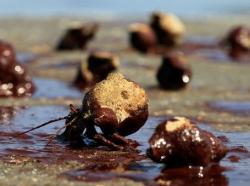Poison Control Monitoring Safety Of Seafood
August 3, 2010 | 2 min to read

ALEXANDRIA, Va. — As workers in the Gulf of Mexico attempt to kill the damaged well that has been spilling oil into the Gulf since late April, officials at U.S. poison centers said they are paying close attention to the safety of seafood and stand ready to answer questions about seafood safety and all other medical concerns related to the disaster.
“We’re happy to answer all questions and assist anyone who has had their health impacted by this event.”
.“During a crisis like this one, it’s natural for people to worry that the food that they eat might be contaminated,” said Jay Schauben, PharmD, director of the Florida/USVI Poison Information Center-Jacksonville. “But federal and state agencies are paying close attention to the oil spill and its potential impact on the safety of seafood harvested in the area.”
Schauben and other health professionals at poison centers in the Gulf Coast region say crude oil could taint seafood with a chemical flavor or odor. But federal and state officials are closely monitoring the seafood for levels of contamination that could pose a risk to human health and are closing fishing waters that could affect the food chain.
“Since this oil spill began, we’ve been fielding calls on a number of issues related to the oil spill, and now food safety is becoming a concern among our callers,” said Mark Ryan, PharmD, director of the Louisiana Poison Center. “We’re happy to answer all questions and assist anyone who has had their health impacted by this event.”
Ryan and Schauben stressed that usual safe food handling practices should protect people eating seafood, and that both the federal and state governments have implemented strong systems to monitor seafood safety and bar harvesting from affected areas.
Since the oil spill began, poison centers have taken nearly 1,000 exposure calls related to the Gulf spill. As of July 29, Louisiana received 254 calls and Florida received 215 calls. Alabama and Mississippi have each also taken more than 200 calls from those concerned about a poison exposure related to the spill.
“Poison centers are available to take calls about all poison exposures 24 hours a day, seven days a week, 365 days a year,” said Jim Hirt, executive director of the American Association of Poison Control Centers. “These centers employ medical professionals who are trained to deal with poison exposures of every variety. Calls are free and confidential. If you have a question about a poison, don’t guess, be sure – call your poison center for free and professional expertise.”
The American Association of Poison Control Centers supports the nation's poison control centers. Poison centers offer free and confidential services 24 hours a day, seven days a week.
For questions about poison or poison prevention, call your local poison center at 1 (800) 222-1222.
Source: American Association of Poison Control Centers
